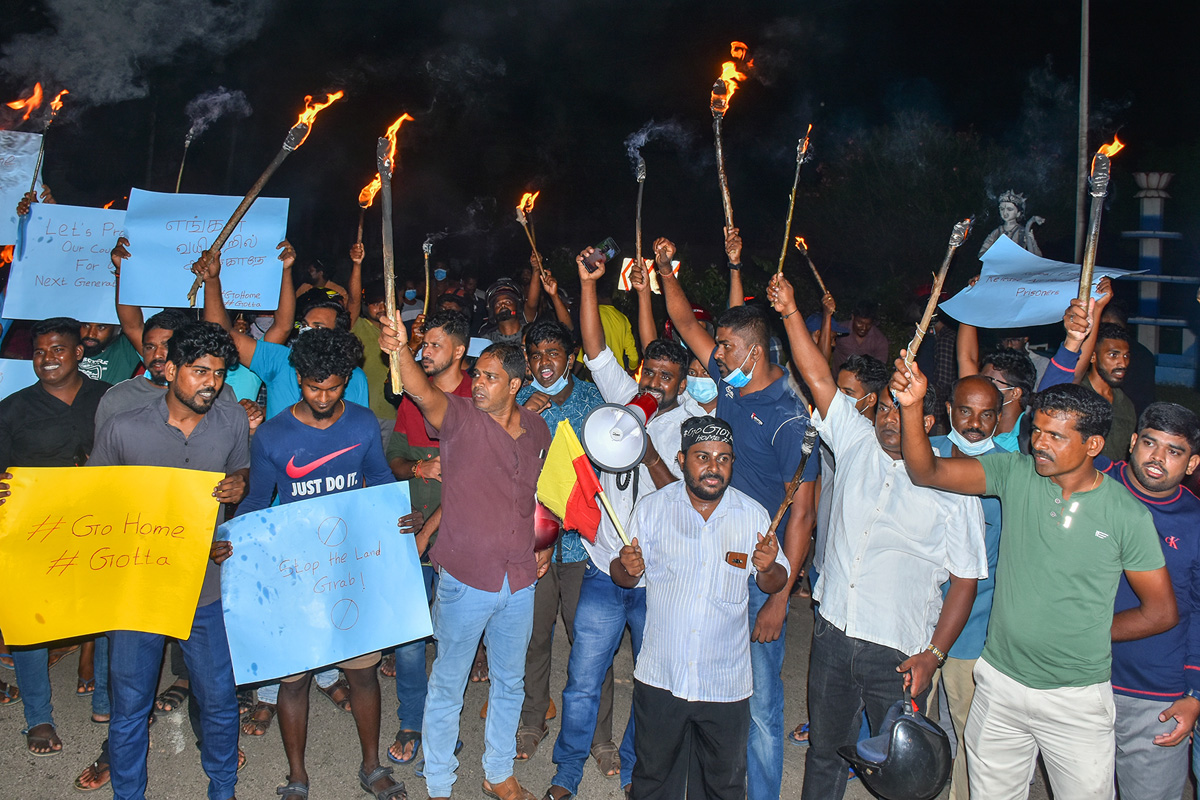
Protesters in Jaffna demanding self-determination this week
Civil society organisations in the North-East and South have called on protesters that are demanding the Rajapaksa regime to change, to also include calls for the structural change of the state that recognises the Tamil right to self-determination.
In a joint statement, a collection of 31 civil society and grassroot groups highlighted that the protests taking place predominantly in the South have “created space for us to realise the absolute necessity to oppose both the corrupt regime and the racist state structure.”
“For the Tamils the demand for structural change includes the very character of the state structure - the unitary nature of the state structure,” the statement said.
Protests have been underway in the South for weeks as the island grapples with a worsening economic and political crisis. Protesters have been demanding for President Gotabaya Rajapaksa and Prime Minister Mahinda Rajapaksa to resign for their role in mismanaging the economy.
“The current historical context has bestowed us with a historic opportunity where peoples reinstate their sovereignty which vests only with peoples. This opportunity should be seized in order to find a lasting solution so that history does not repeat itself.”
The groups stated that while regime change is needed, it “is not the ultimate solution” and the root causes of the problem must be addressed.
“The Rajapaksas should go. There is no argument about it, but seeking to address the root cause of the problem, amidst the demands of the South, such as abolition of the executive presidency being the primary demand, vesting parliament with power rather than consolidating power in the president, and the rest, should not be separated from changing the state structure that oppresses Tamils and Tamil speaking Muslims,” they wrote.
“It is not new knowledge that the Rajapaksas have the history of unleashing violence to suppress the protests as they did in the past,” the organisations said.
“Repressive measures used in the past and present in the North-East would be repeated even in the South, using the military, we fear,” they added.
In their statement, the organisations highlighted that the military offensive that killed tens of thousands of Tamils in the final phase of the armed conflict in 2009 “has not been questioned for many years in the South.”
The Rajapaksa brothers used their “winning the war” narrative in their campaigns to secure their electoral victories.
Amidst the protests, there have been calls for unity to overcome the current economic and political crisis. However, the organisations demonstrate that “both the Rajapaksa regime and a majority of protesters agree on one thing; the military victory over the Tamil people.”
The statement points out that “many do not want to acknowledge that it is this triumphalist mentality that gave the current regime immense power via franchise.”
The organisations also noted that the Rajapaksa borrowed heavily to finance their military campaign during the armed conflict.
“As they were not held accountable for the mass atrocities committed against the Tamils they were also not held accountable for borrowing international capital recklessly that bankrupted the country,” they added.
Despite the armed conflict ending over a decade ago, the North-East continues to be heavily militarised. The Sri Lankan government has also allocated high percentages of their budget to maintain their inflated presence across the region which the civil society groups have said should be “slashed”.
“We submit that the war that took place and the crimes that continue to be committed against the Tamil people are directed against the Tamil people’s political aspiration for self-determination and collective existence as a nation,” the statement added.
The groups reiterated that the “genocidal design” of the crimes perpetrated by Sri Lankan can only end if the Tamil right to self-determination is recognised.
Read the full statement here.
We need your support
Sri Lanka is one of the most dangerous places in the world to be a journalist. Tamil journalists are particularly at threat, with at least 41 media workers known to have been killed by the Sri Lankan state or its paramilitaries during and after the armed conflict.
Despite the risks, our team on the ground remain committed to providing detailed and accurate reporting of developments in the Tamil homeland, across the island and around the world, as well as providing expert analysis and insight from the Tamil point of view
We need your support in keeping our journalism going. Support our work today.
For more ways to donate visit https://donate.tamilguardian.com.

